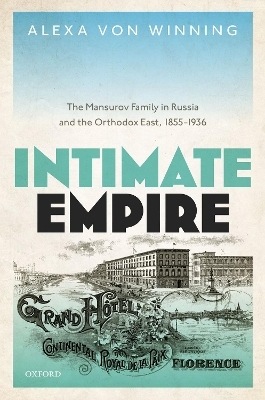
Intimate Empire
The Mansurov Family in Russia and the Orthodox East, 1855-1936
Seiten
2022
Oxford University Press (Verlag)
978-0-19-284441-5 (ISBN)
Oxford University Press (Verlag)
978-0-19-284441-5 (ISBN)
Intimate Empire tells the story of the Mansurovs, a small noble family who played a momentous role in the Russian Empire, as they struggled to reassert the countries importance on the global stage after their defeat in the Crimean War, showing how three generations of a family advanced the intertwined causes of the Russian Empire and Orthodoxy.
After a humiliating defeat in the Crimean War, the Russian Empire struggled to reassert its position as a global power. A small noble family returned from the siege of Sevastopol and joined the rulers' efforts to advance Russian standing in the decades until 1917. Intimate Empire tells the story of the Mansurovs, who were known to nineteenth-century observers as resourceful imperial agents and staunch supporters of Orthodoxy. In close interplay with scholarship and the media, they built churches and pilgrim hostels to increase Russian dominance within its borders and in the Ottoman Empire. Some of the family's achievements stand to this day: the Russian complex in Jerusalem and an impressive Orthodox Convent in Riga. When the Revolution came, they faced stigmatization as former nobles, believers, and monarchists. Impoverishment and arrests became part of their daily lives in Soviet Russia.
Intimate Empire is a study of the momentous role played by elite families in Russia's international involvement in the age of empire. It shows how three generations of a mobile noble family advanced the intertwined causes of the Russian Empire and Orthodoxy, using family resources and tools of intimacy. Women were crucial for the family's efforts, both behind the scenes and in public. It is the first monograph to examine the interplay between family and empire building in Russian history-a topic that has proven extraordinarily prolific for British imperial history yet remains virtually unexplored for the Russian case. Russia, Orthodoxy, and noble family life emerge as part of the European trans-imperial scene.
After a humiliating defeat in the Crimean War, the Russian Empire struggled to reassert its position as a global power. A small noble family returned from the siege of Sevastopol and joined the rulers' efforts to advance Russian standing in the decades until 1917. Intimate Empire tells the story of the Mansurovs, who were known to nineteenth-century observers as resourceful imperial agents and staunch supporters of Orthodoxy. In close interplay with scholarship and the media, they built churches and pilgrim hostels to increase Russian dominance within its borders and in the Ottoman Empire. Some of the family's achievements stand to this day: the Russian complex in Jerusalem and an impressive Orthodox Convent in Riga. When the Revolution came, they faced stigmatization as former nobles, believers, and monarchists. Impoverishment and arrests became part of their daily lives in Soviet Russia.
Intimate Empire is a study of the momentous role played by elite families in Russia's international involvement in the age of empire. It shows how three generations of a mobile noble family advanced the intertwined causes of the Russian Empire and Orthodoxy, using family resources and tools of intimacy. Women were crucial for the family's efforts, both behind the scenes and in public. It is the first monograph to examine the interplay between family and empire building in Russian history-a topic that has proven extraordinarily prolific for British imperial history yet remains virtually unexplored for the Russian case. Russia, Orthodoxy, and noble family life emerge as part of the European trans-imperial scene.
Alexa von Winning is a Lecturer in Eastern European and Modern History at Tuebingen University. She obtained a master's degree in history (2010) and a PhD (2018) at Tuebingen University. During her graduate studies, she was a Short-Term Scholar at the Russian, East European, and Eurasian Center, University of Illinois at Urbana-Champaign, and at the German Historical Institute in Moscow.
Introduction
1: Sevastopol, 1855: Family Networks and Wartime Publicity
2: Jerusalem, 1856-1889: The Russian Compound
3: Constantinople, 1884-1889: Public Archaeology
4: Riga, 1889-1914: Construction and Conflict
5: Moscow, 1904-1917: Return and Revolution
6: Wanderings and Homelessness, 1917-1936
Conclusion
| Erscheinungsdatum | 03.05.2022 |
|---|---|
| Reihe/Serie | Oxford Studies in Modern European History |
| Zusatzinfo | 25 black and white figures/illustrations |
| Verlagsort | Oxford |
| Sprache | englisch |
| Maße | 163 x 241 mm |
| Gewicht | 506 g |
| Themenwelt | Geschichte ► Allgemeine Geschichte ► Neuzeit (bis 1918) |
| Geisteswissenschaften ► Geschichte ► Regional- / Ländergeschichte | |
| Geschichte ► Teilgebiete der Geschichte ► Kulturgeschichte | |
| Geschichte ► Teilgebiete der Geschichte ► Wirtschaftsgeschichte | |
| ISBN-10 | 0-19-284441-5 / 0192844415 |
| ISBN-13 | 978-0-19-284441-5 / 9780192844415 |
| Zustand | Neuware |
| Haben Sie eine Frage zum Produkt? |
Mehr entdecken
aus dem Bereich
aus dem Bereich
Europa 1848/49 und der Kampf für eine neue Welt
Buch | Hardcover (2023)
DVA (Verlag)
48,00 €
Giordano Bruno - ein ketzerisches Leben
Buch | Hardcover (2024)
C.H.Beck (Verlag)
29,90 €


